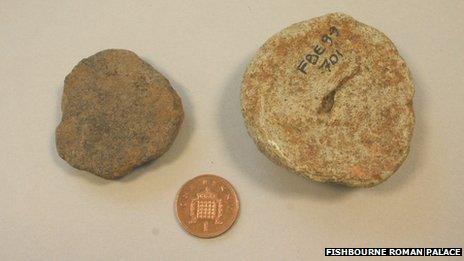Fishbourne Roman Palace pottery 'was toilet paper'
- Published

The pieces had been catalogued as gaming pieces but curator Dr Rob Symmons said that definition had never seemed satisfactory
Pottery pieces once thought to be gaming pieces at a Roman site in West Sussex are now believed to have been used as toilet "paper".
The objects have been in the Fishbourne Roman Palace collection since the 1960s but curator Dr Rob Symmons said their definition never seemed satisfactory.
A breakthrough came when a French expert examined similar items and found partially-mineralized excrement.
Dr Symmons said the items would be re-examined and possibly recatalogued.
He said the pottery fragments had been clipped into a circular shape and were small round discs.
"We always categorised them as gaming pieces," he said.
"I was never particularly keen on that definition, but it's what we called them and it's what they are on our catalogue as at the moment.
"But now we think they are toilet paper.
"Just before Christmas, a paper was published in the British Medical Journal by Philippe Charlier, who is an anthropologist in France, and he has come up with some fairly compelling evidence that they were used for wiping one's bottom."
Greek proverb
Dr Symmons said Charlier not only found a "residue" on similar pieces, but also said the items were often found near latrines.
The anthropologist also cited an ancient Greek proverb which said "three stones are enough to wipe one's arse".
And he found an image on a Greek cup of one of the stones apparently being used.
Dr Symmons said staff at Fishbourne would consider recataloguing the objects and would like to carry out chemical analysis on them.
He said: "Fishbourne Palace lacks the expertise and equipment needed to do this, but I will certainly be suggesting it to specialists in the field who might be interested in this as a project."
He said it was well-known that Romans used sponges on sticks dipped in vinegar as an alternative to toilet paper, but this new theory had come as a revelation.